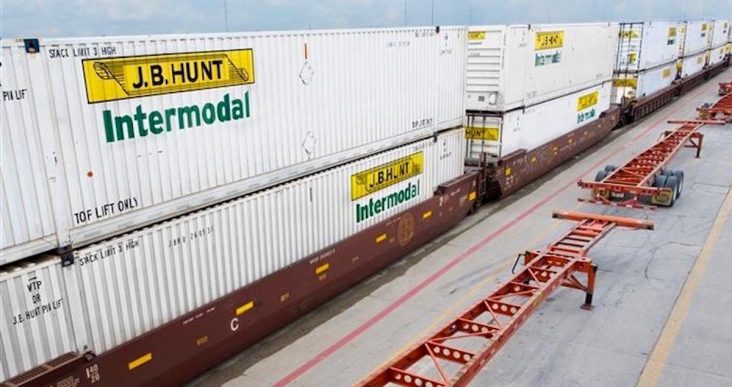J.B. Hunt expected to miss Wall Street expectations in Q3 due to freight market pressures
by October 10, 2023 3:19 pm 773 views

Lowell-based carrier J.B. Hunt Transport Services Inc. is expected to post declines in earnings and revenue in the third quarter as margins are squeezed by pricing pressures and rising costs.
After the markets close on Oct. 17, J.B. Hunt is projected to report earnings fell to $1.86 per share in the third quarter from $2.57 per share in the same period in 2022, based on a consensus of 21 analysts. Revenue is expected to decline by 15.8% to $3.2 billion from $3.83 billion.
In an earnings preview, analysts Justin Long and Jack Atkins and associates Brady Lierz, Grant Smith and Collin Nieman, all of Little Rock-based Stephens Inc., expect J.B. Hunt to miss Wall Street expectations. They attributed the miss to “the continuation of a muted freight cycle, pricing pressure and inflationary costs…While this message sounds like a broken record, we believe some of the leading indicators for the business have recently improved.”
According to the analysts, the carrier’s third-quarter intermodal volumes are expected “to inflect positively (year-over-year) from market share gains aided by the enhanced BNSF relationship and a bottoming of the cycle.” The analysts expect short-term stock volatility, but “we continue to view the 12+ month set-up as compelling given (J.B. Hunt’s) ability to reap the benefits of both a freight market recovery and a company-specific story that has been significantly enhanced into the next up-cycle (i.e. the BNSF relationship).”
The analysts maintained an overweight (buy) rating on the stock and increased the 12-month target price by $7 to $210.
Shares of J.B. Hunt (NASDAQ: JBHT) closed Tuesday (Oct. 10) at $191.53, up $1.78 or 0.94%. In the past 52 weeks, the stock has ranged between $158.66 and $209.21.
Following is a preview by segment:
- Intermodal
The segment comprises about 60% of the carrier’s operating income. Volumes are expected to improve, while pricing remains a headwind. Third-quarter volumes are projected to rise by 1% from the same period last year. In the second quarter, volumes were down 7% from the same period in 2022.
The pricing headwinds are expected to offset the volume improvements from the second quarter. The analysts expect 0.4 percentage points of sequential pressure in intermodal margins.
“In summary, we think the intermodal segment is a battle between near-term pressure in profitability vs. improvement in the leading indicators (particularly as it relates to the benefits of the enhanced BNSF relationship helping support better volume performance),” analysts said.
- Dedicated
The segment comprises about 30% of operating income, and analysts said, “the resiliency of the dedicated business through the cycle is underappreciated, and would point to the segment generating substantial growth in operating income in 2022/2023 during a freight recession.”
Short-term segment challenges include profitability pressure from the second quarter, a weak freight market contributing to lower volumes, higher fuel prices and increased competition. As a result, operating income might be down in the mid-single-digits from the second quarter.
Still, the sales activity pipeline supports the company in reaching its annual target of 1,000 to 1,200 new truck sales. The segment had 570 truck sales in the first half of the year. In 2024, operating income is expected to rise by double-digits from 2023 levels.
- Other segments
The profitability of Final Mile Services and the Truck segments are projected to be flat from the second quarter. Brokerage volumes are expected to fall as the segment increases pricing for low-margin business. Analysts said they “would not be surprised to see (brokerage) volumes down low-double digits sequentially in the quarter, implying a year-over-year decline in the mid-30%s.” Gross margins are expected to be flat at 13%.
“Simply put, we think volumes are likely to underperform the market and gross margins are likely to outperform the market given (J.B. Hunt’s) strategic approach,” analysts said. The brokerage segment is projected to post an operating loss of $8.5 million in the third quarter. The average operating loss was about $5 million in the first half of this year.
The brokerage segment has yet to benefit from the recent acquisition of the brokerage operations of BNSF Logistics because the deal has yet to close. However, the deal is expected to help J.B. Hunt’s brokerage segment to grow in the coming years. J.B. Hunt didn’t share financial details of the deal in its initial announcement; “however, we expect the revenue impact to be a lot more meaningful than the bottom-line impact in the near term,” analysts said.
